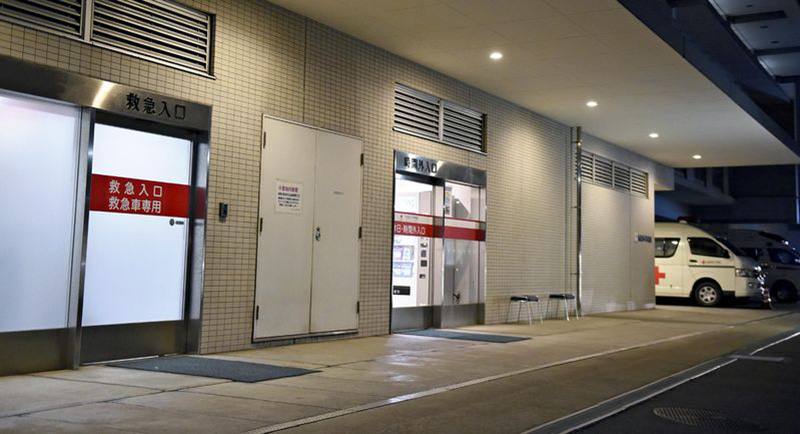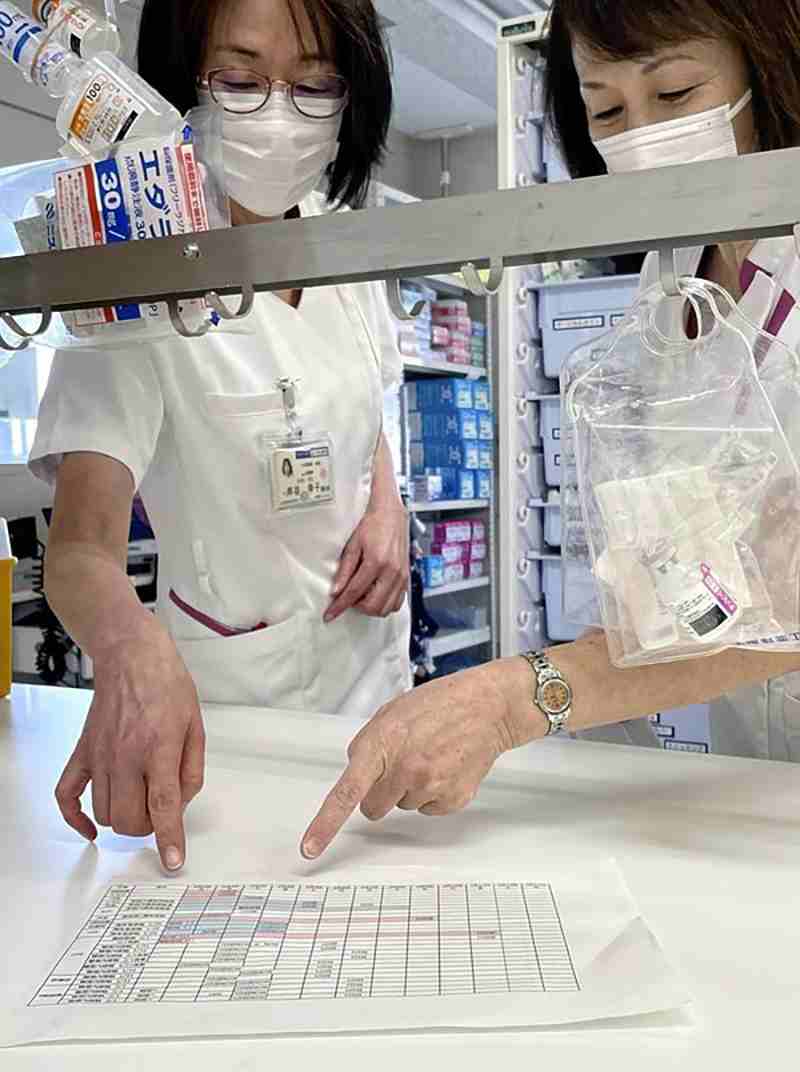
An emergency entrance, left, and an outpatient entrance are seen at Japanese Red Cross Omori Hospital in Ota Ward, Tokyo, on Wednesday.
12:52 JST, February 5, 2022
The Tokyo metropolitan government has requested hospitals to increase their number of emergency beds to accept patients at night and on weekends and holidays, as emergency medical care in the capital is in a critical situation due to the rapid increase in COVID-19 cases.
The request was made to medical institutions in Tokyo on Tuesday as an emergency measure, effective through March 31.
Medical institutions in Tokyo had been asked to do something different in early January: to increase the number of beds for COVID-19 patients as much as possible. But the request put many hospitals in the difficult situation of being unable to provide sufficient beds for non-COVID patients.
Among the causes were the occurrence of in-hospital cluster infections and shortages of hospital staff. At some hospitals, the situation was so serious that they had no choice but to restrict the acceptance of emergency patients.
Rejection of emergency patients has rapidly become common, and the number of serious incidents such as patients being refused by five or more institutions exceeded a daily average of 250 in the week to Tuesday. The labor shortage is becoming more and more serious as medical staff get infected or become close contacts one after another.
The latest request was directed to 150 of the emergency hospitals designated by the metropolitan government. Each of these hospitals already has three or four emergency beds, and the request asked them to secure one more each.
Hospitals are also allowed to temporarily utilize beds allocated for COVID-19 patients for non-COVID emergency patients.
Virus depletes beds, manpower

Hospital personnel check a list of colleagues who cannot work at Kugayama Hospital in Setagaya Ward, Tokyo, on Wednesday.
The emergency medical system at hospitals in Tokyo is in critical situation.
Japanese Red Cross Omori Hospital in Ota Ward, Tokyo, has stopped accepting emergency patients with problems such as bone fractures since Jan. 12.
According to the hospital, it avoids emergency patients who require orthopedic treatment and gives priority to patients whose lives are in danger if they are not treated immediately, such as those suffering stroke or myocardial infarction.
The hospital has 344 beds, but beds for general patients are always full.
In response to a previous request from the Tokyo government, the hospital increased the number of beds for COVID-19 patients from 22 to 42. As a result it had to reduce the number of general beds by about 50. Previously, the hospital accepted about 20 emergency patients a day, but now it is said that the total number is only about 10.
Kugayama Hospital in Setagaya Ward has also curbed the acceptance of emergency services since mid-January, and sometimes stopped accepting emergency outpatients at night due to lack of medical staff. As of Wednesday, more than 20 employees had become unable to work because they got infected or became close contacts.
The hospital has 199 beds, 14 of which are secured for COVID-19 patients, but these beds are already full. The COVID-19 inpatients require more than twice as many nurses as non-COVID patients. Moreover, a large number of elderly patients — due to a cluster infection at a nearby facility for the elderly — increased the burden for the staff.
The hospital said that the situation is barely manageable, and if the number of absent staff members increases by even two or three, restrictions on outpatient treatment will be unavoidable.
According to the Health, Labor and Welfare Ministry, medical institutions nationwide had a record number of 116 cluster infections in the week to Jan. 30. This is significantly higher than the peak of the third wave last winter, when there were 49 cases, and the fifth wave last summer, when there were 30 cases.
“At the time of the fifth wave, there were many patients, but hospital functions were maintained. This time it is a really difficult situation,” one hospital official lamented.Speech
Top Articles in Society
-

Man Infected with Measles Reportedly Dined at Restaurant in Tokyo Station
-

Man Infected with Measles May Have Come in Contact with Many People in Tokyo, Went to Store, Restaurant Around When Symptoms Emerged
-

Woman with Measles Visited Hospital in Tokyo Multiple Times Before Being Diagnosed with Disease
-

Australian Woman Dies After Mishap on Ski Lift in Nagano Prefecture
-

Foreign Snowboarder in Serious Condition After Hanging in Midair from Chairlift in Nagano Prefecture
JN ACCESS RANKING
-

Japan PM Takaichi’s Cabinet Resigns en Masse
-

Japan Institute to Use Domestic Commercial Optical Lattice Clock to Set Japan Standard Time
-

Israeli Ambassador to Japan Speaks about Japan’s Role in the Reconstruction of Gaza
-

Man Infected with Measles Reportedly Dined at Restaurant in Tokyo Station
-

Videos Plagiarized, Reposted with False Subtitles Claiming ‘Ryukyu Belongs to China’; Anti-China False Information Also Posted in Japan






















